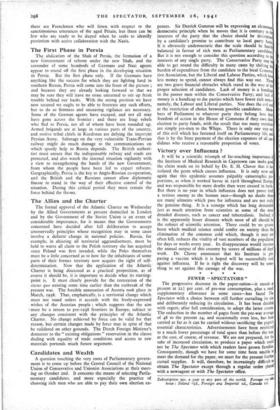Candidates and Wealth
A question touching the very roots of Parliamentary govern- ment is to come up before the Central Council of the National Union of Conservative and Unionist Associations at their meet- ing on October znd. It concerns the means of selecting Parlia- mentary candidates, and more especially the practice of choosing rich men who are able to pay their own election ex- penses. Sir Derrick Gunston will be expressing an elemen democratic principle when he moves that, it is contrary to interests of the party that the choice should be determined by a candidate's promise to contribute to local party fund. It is obviously undemocratic that the scale should be hen balanced in favour of rich men as Parliamentary can But it is not enough to consider this question according to interests of any single party. The Conservative Party may able to get round the difficulty in many cases by shifting burden of expenditure from the candidate to the local Conse tive Association, but the Liberal and Labour Parties, which less money to spend, cannot always find this way out. There are two grave financial obstacles which stand in the way of the proper selection of candidates. Lack of money is a handicap to the poorer men within the Conservative Party; and lack money is a handicap to the parties which have fewer rich men_ namely, the Labour and Liberal parties. Nor does the evil end at the restriction of choice between possible candidates. Mem. bers of Parliament to whatever party they belong lose their freedoin of action in the House of Commons if they owe Mtn election'to party funds, with the result that too many members are simply yes-men to the Whips. There is only one way out of this evil which has fastened itself on Parliamentary life, and that is by the State payment of the election expenses of all can. didates who receive a reasonable proportion of votes.


























 Previous page
Previous page